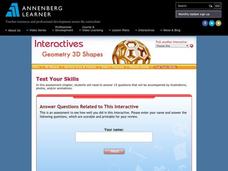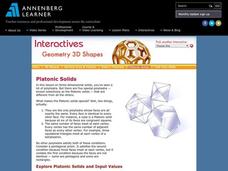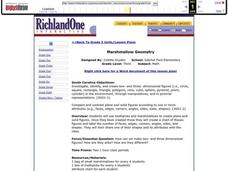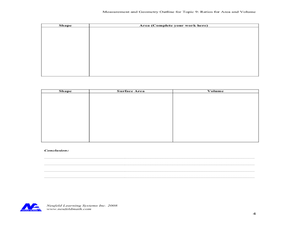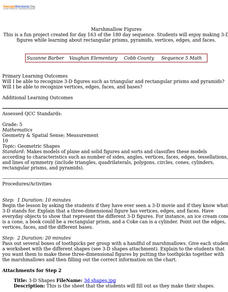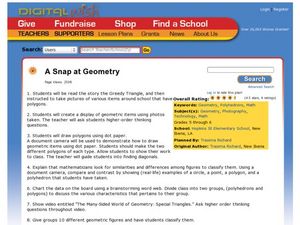Curated OER
Making and Describing Shapes
Explore the concept of creating and describing 2D and 3D shapes. Using geometry your scholars will describe the attributes of shapes and their properties. They explore and discover what happens when you combine shapes and then take...
Curated OER
Guess My Shape
Learners play a game with shapes. They work in groups to identify the names and characteristics of various shapes. They give each other clues to see if others can identify the shape being described. This is a great hands on activity.
Curated OER
Writing Takes Shape!
Learners read The Greedy Triangle and discuss geometric solids. In this geometry lesson, students list the geo-solids in the world and create a graphic organizer to show where geo-solids exist.
Curated OER
Geometric Shapes: Shapes in Everyday Items
Which item is shaped like a cone? Use this multiple-choice shape recognition worksheet to give students access to shapes in their everyday life. Four questions ask scholars to identify which of the pictured items is shaped like a sphere,...
Curated OER
Third Grade Geometry
Third graders describe 2D and 3D shapes. For this geometry lesson, 3rd graders watch a PowerPoint presentation showing the terms used when analyzing shapes: vertex, edge, angle, side, and face. They compare shapes to see what they have...
Annenberg Foundation
Geometry 3D Shapes: Test Your Skills
Time to find out what they've learned! The final lesson of a five-part series has learners complete a 39-question multiple choice review. They use what they've learned in the previous lessons to complete questions that include concepts...
Alabama Learning Exchange
Twisted Tangrams
Primary geometers create a picture using tangrams. In this geometry lesson, students read Grandfather Tang: A Tale Told with Tangrams, cut out their own tangrams, and choose a character from the story to make using their tangram pieces.
Curated OER
Geometry and Quilting
Fourth graders combine geometry and language arts skills while examining quilt-making. After identifying the geometric shapes contained in quilts, they write stories to encompass the quilt border. Students conclude by creating and...
Curated OER
Living in a Geometrical World
Students participate in a series of hand-on, online, and multimedia activities to examine 2 dimensional and 3 dimensional shapes. They describe common geometric solids. They construct rectangular prisms using straws and ribbon.
Curated OER
2D Polygons and 3D Nets
Students compare and contrast two dimensional polygons and three dimentional nets by examining the differences in drawings. They create three dimensional shapes and label the faces, edges, and vertices. After creating the shapes, they...
Curated OER
Exploring Projective Geometry
In this exploring projective geometry worksheet, students use computer software for instruction, then answer 9 questions about 3D drawings.
Annenberg Foundation
Geometry 3D Shapes: Platonic Solids
From polyhedrons to platonic solids, here is a lesson that will have your classes talking! As an introduction to platonic solids, scholars cut and fold nets to create the three-dimensional solids. They use an interactive component to...
Fun Stuff To Do
Square Pyramid
Your geometry learners will appreciate this net for a square pyramid. Copy, cut, and manipulate to explore the surface area or volume of a square pyramid.
Curated OER
A Cone and Its Net
Create and investigate nets for solid shapes with your class. They identify the different parts and faces of each polygon and solid then calculate the surface area and volume of cones. They use circle sectors of varying sizes to build...
Curated OER
Marshmallow Geometry
Third graders create 2D and 3D shapes using marshmallows and toothpicks. In this geometry lesson, 3rd graders create their shapes and document the number of faces, edges, corners, angles, and sides. They share one shape and its...
Curated OER
Using Concept Maps to Design 3D Spheres
High schoolers create three dimensional shapes using concept maps. In this geometry lesson, students investigate the impact of mental schemas on humans. They collect data on this topic and plot their data on a coordinate plane.
Exploratorium
Building Three-Dimensional Structures
Are you looking for a good 3-D geometry lesson plan that includes hands-on activities for your middle schoolers? Look no further than this one! Pupils use centimeter grid paper embedded in the plan, along with detailed construction...
Curated OER
Ratios for Area and Volume
In this ratios for area and volume worksheet, students solve problems where they find the ratios for problems of shapes dealing with area and volume. Students complete 4 problems.
Curated OER
Marshmallow Figures
Students enjoy making 3-D figures while learning about rectangular prisms, pyramids, vertices, edges, and faces. After a lecture/demo, students use marshmallows, toothpicks and a worksheet imbedded in this lesson to create 3 dimensional...
Curated OER
A Snap at Geometry
Students study geometric images and polyhedrons. In this geometry lesson plan, students complete several activities to learn about geometric shapes and classify polyhedrons from polygons. Students watch a video, complete a web-directed...
Texas Instruments
TI-Nspire™ CAS
When it comes to rating educational calculators, this calculator is always near the top of this list. Now it's available as an app. There is a lot of calculator power wrapped up in this app. Not only is this a fully functioning...
Curated OER
Polydron Fun
Students investigate nets as they relate to volume and area. In this geometry lesson, students use nets as a visual to deepen their understanding of surface area and volume of objects. They make conjectures about different objects and...
Curated OER
Coordinate Plane
Tenth graders plot points on a coordinate plane. In this geometry lesson, 10th graders identify the different quadrants, plots points on a number line and coordinate plane and solve for the midpoint of line segments.
Curated OER
Foil Fun
Second graders be having hands-on experiences with three-dimensional solid shapes. They investigate the features of solid shapes and examine the names for them. They are introduced to making nets for 3D shapes.







